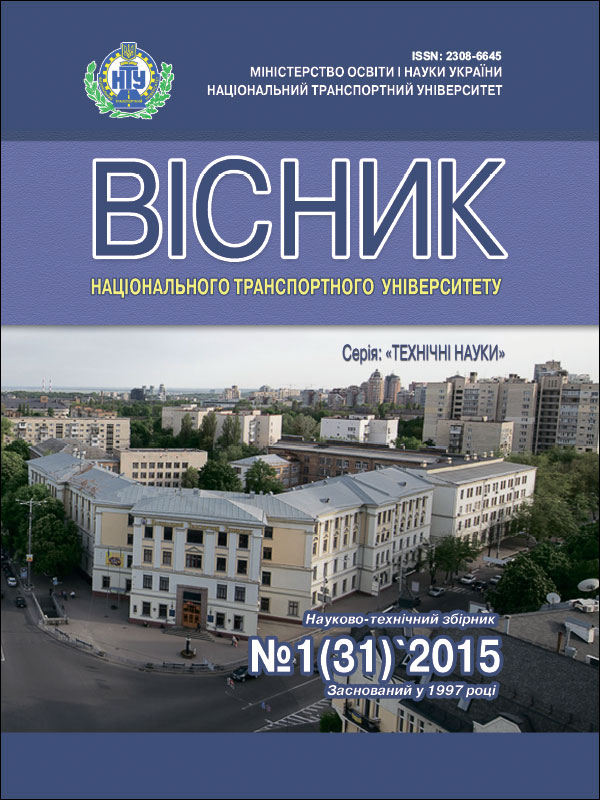ECONOMIC BASICS OF PERISHABLE CARGO DELIVERY MANAGEMENT
ABSTRACT
Melnychenko O.I., Bohomolova N.I. Economic basics of perishable cargo delivery management. Visnyk National Transport University. Series «Economic sciences». Scientific and Technical Collection. - Kyiv: National Transport University, 2020. - Issue 2 (47).
The article explores the main problems of managing the perishable cargo delivery, identifies the economic aspects of the development of logistics technologies. The foundations of increasing the efficiency of the perishable products delivery control system are proposed.
Object of the study - supply chain management of perishable products.
Purpose of the study - the systematization of processes of economic management framework of perishable cargo delivery and the development of proposals to improve its efficiency.
Methods of the study - system generalization, method of comparisons, classification and analytical.
Transportation of perishable products requires increased attention to maintaining the quality of the cargo. This is achieved by thorough preparation for transportation, strict compliance with numerous requirements for load, placement, packaging, delivery time, etc. All this places high demands on the process of organizing transportation, in terms of coherence and coordination of participants' actions, requires compliance with standards, quality planning of both the process and the delivery result.
Based on the analysis of the main trends in the development of supply chain management system of perishable products, the essence and features of the basic principles manifestation of the delivery management process are substantiated and characterized. Among these principles stand out: consistency, innovation, coordination, balance and efficiency. These principles are implemented in the technical, technological and organizational and economic components of the management system.
The essence of the economic mechanism for managing the perishable goods delivery is revealed. The effectiveness of the mechanism is achieved by the synergistic effect of its components, the action of levers and instruments of organizational and economic regulation. The consistency of the elements of the supply chain management mechanism helps to balance the economic interests and efforts of delivery entities.
The results of the article can be used by transport and logistics enterprises to form the basis for improving the delivery of perishable and other types of products.
KEYWORDS: TRANSPORT; ENTERPRISES; PERISHABLE CARGO; LOGISTICS; DELIVERY; MANAGEMENT; EFFICIENCY.
REFERENCES
- Afanasyev K. M. Model optymizatsiyi systemy upravlinnya lantsyuhamy postachan [The model of optimization of supply chain management system]. Infrastruktura rynku - Market infrastructure, 6, 2017, рр.. 250-253.
- Bocharova N. A. Udoskonalennia struktury mekhanizmu formuvannia lantsiuha postachan [Improving the structure of the supply chain formation mechanism.] Ekonomika transportnoho kompleksu, issue 33, 2019, рр. 45-59.
- Vorkut T.A., Sopotsko O.Y. Upravlinnia postachanyamu schvudkopsyvnux productiv v sustemah lanzygiv postachan [Supply management of perishable prroducts in systems of supply chains.] Visnuk NTU - Visnuk NTU, Series «Economy science», issue 2 (41), 2018, 32-39.
- Oklander M.A. (2004) Logistichna sistema pidpriemstva [Logistics system of the enterprise], monograph, Odessa, Astroprint, 312 p. [in Ukrainian].
- Chornyi V.V., Platonov O.I. Pryntsypy ekonomichnoi bezpeky pidpryiemstv u multymodalnykh perevezenniakh vantazhiv [Principles of economic security of enterprises in multimodal cargo transportation] Ekonomichnyi Chasopys - KhKhI Naukovyi Zhurnal, issue №7-8 (1), 2015, рр. 50-53.
- Sych Y.M. (2003) Ekonomika Rozvytku Zaliznychnoho Kholodotransportu [Economy of development of rail cold transport]. Kyiv, Aspekt Polihraf, 223 p. [in Ukrainian].
- Chukhray N.I. Hirna O. B. (2007) Formuvannja lancjuga postavok: pitannja teoru і praktiki [Formation of supply chain: questions of theory and practice], monograph, Lviv, Intellect-West, 232 p. [in Ukrainian].
AUTHOR
Melnychenko O.I., Candidate of Science in Engineering, Professor, Scientific Secretary of National Transport University, e-mail: melnichenko@ntu.edu.ua, tel. + 38 (044) 280-01-49, M. Omelianovycha- Pavlenka Str., 1, Kyiv, 01010, Ukraine, orcid.org/0000-0001-9694-9824
Bohomolova N.I., Doctor of sciences in economic, Professor, State University of Infrastructure and Technology, Head of Department of Finance and Credit, e-mail: bogomolovan@ukr.net, Ukraine, 03049, Kyiv, І. Ohiienka street. 19, of. 904a, orcid.org/0000-0001-5376-2437
REVIEWER
Yanovska V.P., Dr., Professor, State University of Infrastructure and Technology, Professor, a.i. Head of Economicy, Marketing and Business Administration Department, Kyiv, Ukraine.
Hurnak V.M. Dr., Professor, National Transport University, Professor of Transport Law and Logistics Department, Kyiv, Ukraine.
Article language: Ukrainian
Open Access: http://publications.ntu.edu.ua/visnyk/47/156.pdf
Print date: 15.04.2020
Online publication date: 27.10.2020
